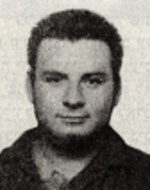Shlomo, son of Eugenia Asher, was born on 20.10.1948 in Ramat Gan. He studied at the “Nitzanim” elementary school and later graduated from the Blich High School in the real world. Shlomo was educated in his home as a Zionist educator, as his parents, who arrived from Cyprus as immigrants, taught him. He was active in the social life of the school and served as chairman of the student council. He was a member of the Yarkon tribe of the Scout movement, was a counselor and later a battalion commander. With his friends in the movement, he joined Kibbutz Beit HaEmek, where he worked in the cowshed and loved his work and the day-to-day care of animals, because of his love for animals Shlomo went to Utrecht in the Netherlands to study veterinary medicine. The fourth year of the school year, after he was awarded the degree of “graduate.” During one of his vacations he studied at the Rothenberg Seminar in Haifa on behalf of the Jewish Agency, and was active in the social life of the Israeli colony in the Netherlands. And took part in public debates with Arabs about the problems of the Middle East He was very warm and pleasant, and he had many friends, he had warm and warm feelings, which he expressed in his youth when he wrote poems, Shlomo was drafted into the IDF at the end of July 1966 and completed his military service in the Nahal Brigade. In early September 1969, Shlomo was discharged from regular service and assigned as a combat soldier in a reserve unit of the Armored Corps. When the Yom Kippur War broke out, Shlomo made his studies in Utrecht, Holland. He rushed to the Israeli embassy and asked to return to Israel, but was refused. Since he did not want to wait in vain, he went to Frankfurt, Germany, and managed to board a plane that they brought to Israel on Tuesday, October 9, 1973. The next day he was already fighting with his unit in the northern sector of Sinai. On the 15th of Tishrei 5740 (October 15, 1973), Shlomo’s company set out for the “Budapest” stronghold, which was blocked by an Egyptian commando unit. In the course of the movement, fire and shells would explode on the force. Three of the armored personnel carriers were wounded in this fire, among them the platoon commander, the commander of the squad, and four fighters, who were counted on Shlomo’s force.In the moments of slackness that prevailed, Shlomo maintained his composure and took orders for his stunned comrades. So he crawled, under fierce fire, into the half-tracks, took out the mortar and began to fire shells at the enemy. When he ran out of ammunition, he returned to the half-track, which was under heavy shelling, took out the machine gun and continued to fire at the enemy, killing him and killing him. He was brought to rest in the cemetery in Kiryat Shaul, leaving behind his parents and two brothers, and after his fall he was promoted to the rank of corporal. : “My soul is consumed by the horrors of battle / chicken Skyscrapers are strewn with the corpses of heroes. “But just now, Shaul,” he said, “is more than seven times fought … and blood is shed …” His name was immortalized in a memorial booklet in which his poems, letters and things were gathered in his memory.
